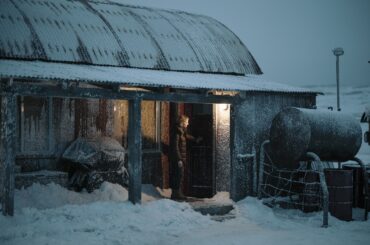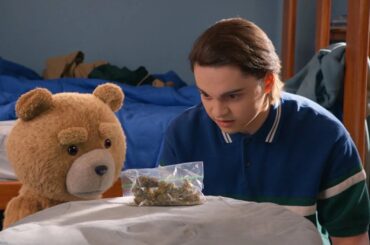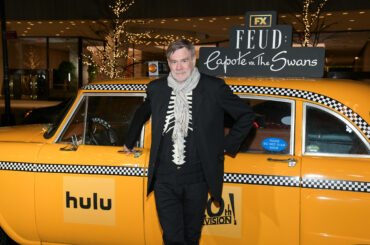Fallen Leaves is the latest film from legendary auteur Aki Kaurismäki. It is his 20th film and the fourth film of the Proletariat Series. It stars Alma Pöysti and Jussi Vatanen as would-be lovers set in a very real terrain of modern Finland with poverty all around and a backdrop of war.
Kaurismäki has made yet another timeless classic that harkens back to the days of Chaplin and Keaton where the lives shown are difficult but the tone is so compassionate and heartwarming that the viewer gets the best of both worlds.
Since its debut last May at the 76th Annual Cannes Film Festival, it has gone on to be one of Kaurismäki’s most celebrated films. It won the Jury Prize at Cannes and was selected as the Top 5 International Films by the National Board of Review, Pöysti was nominated for Best Actress in a Comedy by the Golden Globes, and the film was selected for the Shortlist for International Film for the Academy Awards.
Amid awards season, stars Alma Pöysti and Jussi Vatanen connected with me for a Zoom call. The conversation has been edited for clarity.
The humanity of this film is very compelling. How’d you feel about how Fallen Leaves balances sadness and joy?
Alma Pöysti: I think it’s a very warm film and it’s compassionate, it’s a film also about compassion and caring in many ways and the many sorts of faces of love. And yeah, it does give you hope, doesn’t it? In the most brutal way, because it’s also very honest and there’s nothing sugary around this love story. It’s more salt, and that makes it somehow you connect to it.
I think many people can feel a connection to the loneliness and the longing and maybe the hope of finding someone someday. But then it’s hard work and tough choices and it demands a lot of you from you to fall in love and a lot of courage
There are many real moments in the film, like when your character buys dishes for their first date and then throws them out when it ends badly. Was that improvised?
Alma Pöysti: No, it’s all in the script. It’s a beautifully written story with a turning point of events when they finally meet and they have this dinner and they act like you are supposed to, I guess, on a date, but they’re awkward about it. There are no dating professionals around there. And then there comes the moment when they need to face each other and she says, “I like you, but I won’t have a drunk.” And then he leaves and then she throws away the plate. And that’s such a painful moment. But it’s also a moment when I’m sort of in a painful way happy for her that she doesn’t try to help him or save him or become codependent, which would be the usual trap when you are deeply in love with someone, which I think she is at that point. And for her to do that is extremely painful.
Can you talk about the radio coverage of the Ukraine war and how that was an undercurrent to the overall story?
Alma Pöysti: (In Finland) We hear the news all the time and we follow very closely what’s going on and we feel great solidarity of course with what’s happening. And it’s a very real situation.
In the essence of the movie, I like how it’s there and it doesn’t serve anything else. It’s just literally, this is just life. You just have these things in your life that could grab your attention, but the focus is on the individuals.
Alma Pöysti: It was almost like a backdrop but it serves many purposes in a way. It’s a reminder that life is very fragile and it can be taken away from you in a second. So what are you going to do about your day? It brings the whole carpe diem thing to it. So you have the opportunity to fall in love. Are you going to take it? That’s kind of what’s underneath for me at least. I mean, this is only my thoughts.
Jussi Vatanen: There’s always some sort of crisis and some sort of war going on. And Aki said in one interview that he couldn’t have made this film without somehow accommodating the war in Ukraine. He feels that it is such an important thing that is going on. He also said that this film works like a time capsule and that if somebody sees this film after 20 years, after 30 years, they will remember that this tragedy happened back in those days.
What was your first impression of the script?
Jussi Vatanen: How Aki has built up the world and his fairytale. As an actor, I didn’t have a feeling that I needed to add anything or try to too much invent something by myself because the script felt so, so ready and so beautiful. In terms of the essence of acting, Aki has a certain style and a certain genre. And growing up in Finland, we’ve seen his films for all of our lives. So we sort of knew how we should portray our roles and how should we do them, and it was very exciting and truly fun to throw ourselves into that world.
He is very much an auteur and when you watch one of his movies, it’s part of a lineage of movies, like this film is part of the Proletariat series.
Alma Pöysti: That’s what he calls it, the fourth and last part of the working class series.
What is it like now being part of this tradition?
Alma Pöysti: It is amazing to be part of it. Some people are seeing their first Aki film with this one, and I almost want to congratulate them because they have so many wonderful things to discover. The thing about Aki’s movies is that they are so timeless. Like this one, this is the newest one, but it’s also timeless. They do age well.
How was acting with the dog?
Alma Pöysti: Well, the dog’s name is also Alma actually, so I get it’s destiny. We had a great time. She’s a street dog from Portugal and this is her debut in front of a camera she blew us away with her talent, her sense of rhythm, and her professionalism. She has such a strong presence and the way she’s listening, listening in, and staying in character, I think it’s very, very impressive. And she could do the one takes.
Let’s talk for a moment about that. I read that Aki does very few takes. What was that like? Did you want to do more or did you just kind of go with what you wanted?
Jussi Vatanen: Well, we’ve been doing TV and movies quite a lot previously and it’s always, for me at least, it’s always been with the digital camera and you have an endless amount of takes and very many angles. So you have the chance to do, the scene dozens of times, which is also fun, which is also you can find a different solution or try something else. But to have Aki tell us before we started that he usually goes with one take only and that pretty much was the case. And at the beginning, it was terrifying just to have a chance to work with this legend and supposedly try to do it with one take.
Alma Pöysti: I agree it was terrifying, especially with the combination of no rehearsing. But then when you understand why you get these very precious moments when something is happening for the first and only time together with the camera and that is very hard to repeat. There is a certain honesty and almost rawness to those moments that, well, as soon as you repeat it, you have to pretend a little bit more. And each time the moment wears down a little bit. So if you manage to capture those moments, you, yeah, it’s quite wonderful. And I guess we started to love this way of working almost getting obsessed with really catching these moments, getting them done all right at the first time. It was a very beautiful way of working. But I do agree, I mean there are many ways to roam. You can also keep investigating those moments forever.
Fallen Leaves is now available to stream on Mubi.





